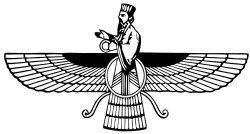Ahura
| Part of a series on |
| Zoroastrianism |
|---|
 |
|
|
Ahura (Avestan: 𐬀𐬵𐬎𐬭𐬀) is an
Etymology
The Rigveda says that Asura such as the “Father Asura”, Varuṇa, and Mitra, are “older gods” who originally ruled over the primeval undifferentiated Chaos.[1]
It is commonly supposed[6][7][8] that Indo-Iranian *Hásuras was the proper name of a specific divinity with whom other divinities were later identified.
In scripture
Gathas
In the
The Gathas do not specify which of the divinities other than Ahura Mazda are considered to be ahuras but does mention other ahuras in the collective sense.[10]
Younger Avesta
In the Fravaraneh, the traditional name for the Zoroastrian credo summarized in Yasna 12.1, the adherent declares: "I profess myself a Mazda worshiper, a follower of the teachings of Zoroaster, rejecting the daevas ... " This effectively defines ahura by defining what ahura is not.
In the Younger Avesta, three divinities of the Zoroastrian pantheon are repeatedly identified as ahuric. These three are Ahura Mazda, Mithra, and Apam Napat, the "Ahuric triad". Other divinities with whom the term "Ahuric" is associated include the six Amesha Spentas, and (notable among the yazatas) Anahita of the Waters and Ashi of Reward and Recompense.
See also
References
- ^ a b Kuiper, F. B. J. (2011-07-29). "AHURA – Encyclopaedia Iranica". IranicaOnline.org. Retrieved 2024-04-29.
- ISBN 978-81-208-0061-8. Retrieved 24 January 2021.
- ISBN 978-81-208-0815-7. Retrieved 24 January 2021.
- ISBN 978-90-04-08847-4. Retrieved 24 January 2021.
- ISBN 9784863375420.
- ^ Thieme 1960, p. 308.
- ^ Gershevitch 1964, p. 23.
- ^ Kuiper 1983, p. 682.
- ^ "DAIVA – Encyclopaedia Iranica". www.iranicaonline.org. Retrieved 2019-07-14.
- ^ "AHURA – Encyclopaedia Iranica". www.iranicaonline.org. Retrieved 2019-07-14.
Bibliography
- Boyce, Mary (1975). History of Zoroastrianism. Vol. I. Leiden, NL: Brill.
- Boyce, Mary (1983). "Ahura Mazda". Encyclopaedia Iranica. Vol. 1. New York, NY: Routledge & Kegan Paul. pp. 684–687.
- Gershevitch, Ilya (Jan 1964). "Zoroaster's own contribution". Journal of Near Eastern Studies. 23 (1): 12–38. S2CID 161954467.
- Kuiper, Bernardus Franciscus Jacobus (1983). "Ahura". Encyclopaedia Iranica. Vol. 1. New York, NY: Routledge & Kegan Paul. pp. 682–683.
- Thieme, Paul (Oct–Dec 1960). "The 'Aryan' gods of the Mitanni treaties". Journal of the American Oriental Society. 80 (4): 301–317. JSTOR 595878.
